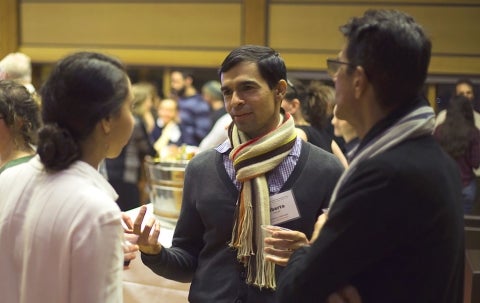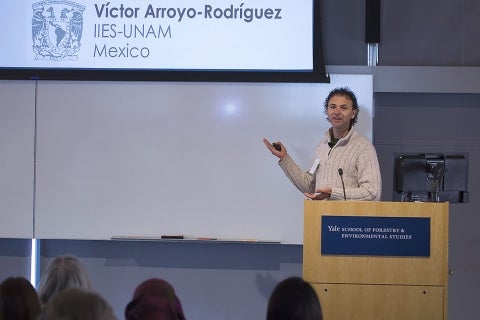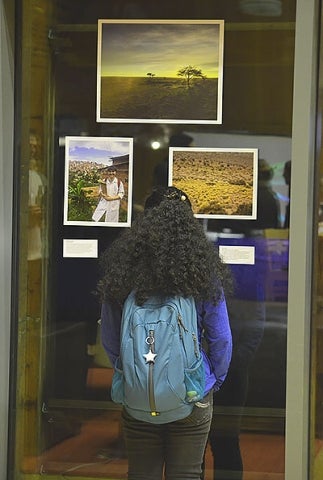Note: Yale School of the Environment (YSE) was formerly known as the Yale School of Forestry & Environmental Studies (F&ES). News articles and events posted prior to July 1, 2020 refer to the School's name at that time.

Every year roughly 18.7 million acres of land is deforested. Particularly at risk are tropical rainforests, home to some of the world’s most diverse ecosystems. Last weekend, researchers, practitioners, and students from around the world gathered at Yale to discuss the challenges of deforestation and sustainable livelihoods at the annual International Society of Tropical Foresters (ISTF) conference.
The ISTF conference is the longest running conference in the history of the Yale School of Forestry & Environmental Studies (F&ES). In fact, even when the ISTF — a U.S.-based organization of natural resource professionals concerned with tropical forestry — disbanded in 2012, the F&ES student chapter continued convening the conference. With the ISTF organization reconvening again this year, the conference and Yale ISTF student group has served as a launch pad.
The ISTF conference is the longest running conference in the history of the Yale School of Forestry & Environmental Studies (F&ES). In fact, even when the ISTF — a U.S.-based organization of natural resource professionals concerned with tropical forestry — disbanded in 2012, the F&ES student chapter continued convening the conference. With the ISTF organization reconvening again this year, the conference and Yale ISTF student group has served as a launch pad.

“Now in its 24th year, this conference has provided continuity to the discipline while being a hub for research and practice around tropical forests,” said conference co-chair Ethan Miller ’18 M.F. This year’s entirely student-run conference was titled “Attending to Socio-ecological Complexity in Tropical Forest Landscapes.”
During the conference, keynote speaker Nigel Sizer, chief operating officer of the Rainforest Alliance, spoke of a “crisis of accountability” and failure of governments and companies to uphold sustainability commitments. Still, he remained hopeful of the potential for new accountability frameworks and efforts initiated by companies themselves.
Practitioners, including Zoraida Calle, a founding member of Colombia’s Center for Research on Sustainable Agriculture Production Systems, Mirjam Kuzee, forest landscape restoration coordinator of the International Union for the Conservation of Nature, and Eva Garen, director of the F&ES-based Environmental Leadership and Training Initiative, spoke of key challenges around corruption, properly evaluating ecosystem services, and tensions between short-term funding with longer term projects.
In addition to keynote and panelist discussion sessions, the conference included opportunities for skill sharing and an innovation prize competition.
During the conference, keynote speaker Nigel Sizer, chief operating officer of the Rainforest Alliance, spoke of a “crisis of accountability” and failure of governments and companies to uphold sustainability commitments. Still, he remained hopeful of the potential for new accountability frameworks and efforts initiated by companies themselves.
Practitioners, including Zoraida Calle, a founding member of Colombia’s Center for Research on Sustainable Agriculture Production Systems, Mirjam Kuzee, forest landscape restoration coordinator of the International Union for the Conservation of Nature, and Eva Garen, director of the F&ES-based Environmental Leadership and Training Initiative, spoke of key challenges around corruption, properly evaluating ecosystem services, and tensions between short-term funding with longer term projects.
In addition to keynote and panelist discussion sessions, the conference included opportunities for skill sharing and an innovation prize competition.

The first-place recipients of the ISTF Innovation Prize were Loreta Alsa and Denise Matias. They documented an indigenous community-led project to restore wild honey bee habitats in the Philippines.
“It’s been really interesting to see key aspects of the theme we were discussing a year ago when planning the conference come together the last few days on stage,” said conference co-chair Liz Felker ’19 M.E.Sc.
Ensuring diverse voices were at the table was a priority among students organizing the conference. Through collaboration with Yale’s Native American Cultural Center, the conference invited Kalani Souza, a native Hawaiian, poet activist, and founding director of the Olohana Foundation. He spoke of new research models that required approaching solutions through relationship building. Mariteuw Chimère Diaw, of Cameroon, manager of the African Model Forest Network, also spoke of the importance of indigenous viewpoints and warned of applying outside frameworks without an understanding for local structures and incentives.
Creating connection between participants from international agencies and local NGOs, practitioners and researchers, mentors and peers, the ISTF conference was a step towards tackling the socio-ecological complexity of tropical forests.
“It’s been really interesting to see key aspects of the theme we were discussing a year ago when planning the conference come together the last few days on stage,” said conference co-chair Liz Felker ’19 M.E.Sc.
Ensuring diverse voices were at the table was a priority among students organizing the conference. Through collaboration with Yale’s Native American Cultural Center, the conference invited Kalani Souza, a native Hawaiian, poet activist, and founding director of the Olohana Foundation. He spoke of new research models that required approaching solutions through relationship building. Mariteuw Chimère Diaw, of Cameroon, manager of the African Model Forest Network, also spoke of the importance of indigenous viewpoints and warned of applying outside frameworks without an understanding for local structures and incentives.
Creating connection between participants from international agencies and local NGOs, practitioners and researchers, mentors and peers, the ISTF conference was a step towards tackling the socio-ecological complexity of tropical forests.
Michelle Winglee ’19 M.E.Sc. is a first-year student at the Yale School of Forestry & Environmental Studies.
Published
February 9, 2018